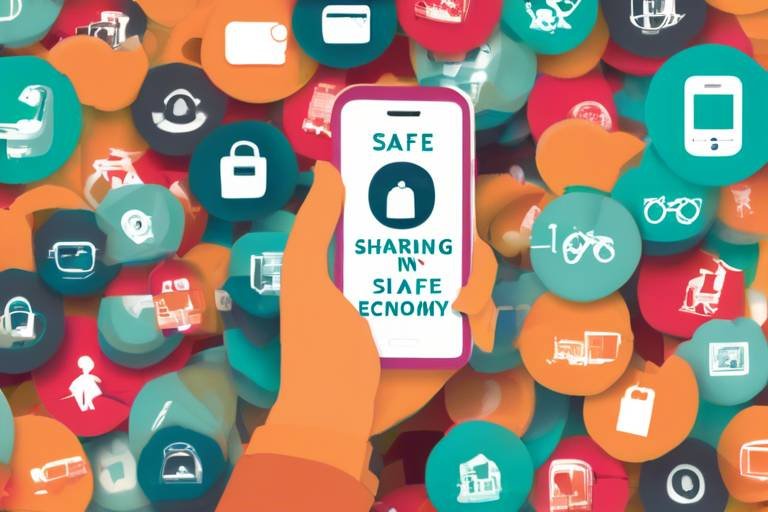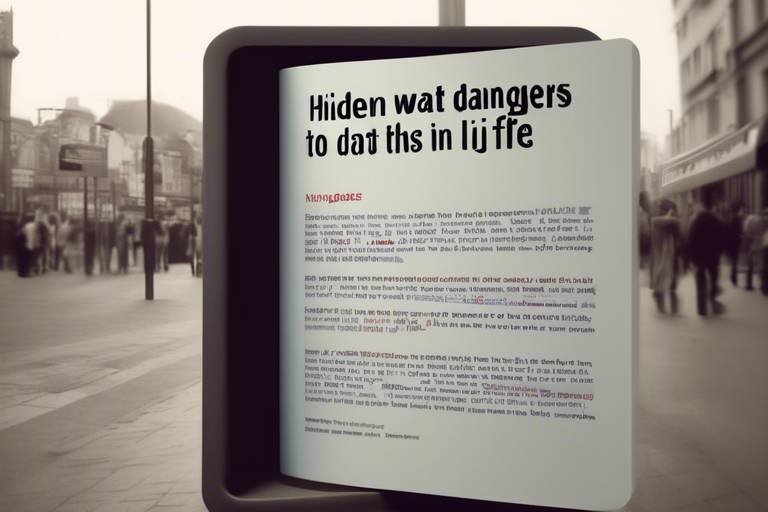Dealing with Internet Trolls: A Safety Guide
In today’s digital world, the internet can be a double-edged sword. While it offers incredible opportunities for connection and expression, it also opens the door to negativity and hostility. One of the most notorious pitfalls of online interaction is the presence of internet trolls. These individuals thrive on chaos, often targeting others with the intent to provoke, harass, or simply entertain themselves at the expense of others. This article provides essential strategies and insights for effectively managing online trolls, ensuring a safer digital experience while maintaining mental well-being in the face of online negativity.
To effectively deal with trolls, it’s crucial to understand who they are and what drives their behavior. Internet trolls are often characterized by a desire for attention, a penchant for chaos, and a lack of empathy. They may be motivated by a variety of factors, including boredom, a need for validation, or even personal issues that manifest in their online interactions. By recognizing the underlying psychology behind trolling, we can better equip ourselves to handle these situations without becoming victims of their antics.
Identifying troll behavior can sometimes feel like trying to spot a needle in a haystack. However, there are distinct signs that can help you differentiate between genuine criticism and malicious trolling. Trolls often employ a variety of tactics designed to provoke an emotional response. Some common behaviors include:
- Personal attacks: Direct insults or derogatory comments aimed at individuals.
- Misinformation: Spreading false information to confuse or upset others.
- Emotional manipulation: Using guilt or shame to provoke a reaction.
By being aware of these tactics, you can better navigate your interactions online and maintain your composure in the face of adversity.
Not all trolls are created equal. Understanding the different types can provide insights into their unique characteristics and methods. Here are a few common categories:
Provocateurs are the masters of stirring the pot. They thrive on controversy and often post inflammatory comments designed to incite reactions from others. Their goal is not necessarily to harass but rather to engage others in heated debates, often for their amusement. If you encounter someone who seems to enjoy pushing buttons, you might be dealing with a provocateur.
Bullies, on the other hand, take trolling to a more aggressive level. Their tactics are often more personal, targeting individuals with the intent to belittle or intimidate. The emotional impact of their actions can be severe, leaving victims feeling isolated and demoralized. Recognizing a bully’s tactics—such as repeated harassment or threats—can help you take appropriate action.
Understanding common trolling tactics can arm you with the knowledge needed to combat them effectively. Here are some prevalent strategies used by trolls:
- Personal attacks: Direct insults aimed at you or your character.
- Misinformation: Spreading lies or half-truths to confuse others.
- Emotional manipulation: Using guilt or emotional pressure to provoke a response.
By anticipating these tactics, you can prepare yourself to respond in a way that minimizes their impact on your mental well-being.
When faced with trolls, having a game plan can make all the difference. Here are some effective strategies for managing interactions:
One of the most straightforward ways to deal with trolls is to utilize the blocking and reporting tools available on most platforms. By blocking a troll, you can prevent them from contacting you or viewing your content. Reporting their behavior to the platform can also help create a safer online environment for everyone. Remember, you have the right to protect your digital space!
While it may seem counterintuitive, there are times when engaging with trolls constructively can be beneficial. If you choose to respond, maintain your composure and set clear boundaries. Use humor or logic to defuse the situation, but always prioritize your mental health. Sometimes, simply refusing to engage can be the most powerful statement you can make.
The emotional toll of trolling can be significant, making it essential to prioritize your mental well-being. Here are some tips to help you stay grounded:
Developing emotional resilience is key to coping with online negativity. Techniques such as mindfulness practices, meditation, and positive self-talk can help you build a stronger mental framework. Think of it like building a fortress around your mind—one that can withstand the arrows of negativity.
Don’t hesitate to reach out for support from friends, family, or mental health professionals when dealing with the effects of trolling. Sharing your experiences can lighten the emotional load and provide you with valuable perspectives. Remember, you’re not alone in this battle!
Q: What should I do if I encounter a troll?
A: Consider blocking or reporting them. If you feel safe doing so, you can engage constructively, but prioritize your mental health.
Q: Are all trolls the same?
A: No, there are different types of trolls, such as provocateurs and bullies, each with unique tactics and motivations.
Q: How can I protect my mental health from online negativity?
A: Build resilience through mindfulness, positive self-talk, and seeking support from friends or professionals.

Understanding Internet Trolls
This article provides essential strategies and insights for effectively managing online trolls, ensuring a safer digital experience while maintaining mental well-being in the face of online negativity.
When we think about the term troll, images of mischievous internet users often come to mind. However, understanding the psychology behind these individuals is crucial for navigating the sometimes treacherous waters of online interactions. Internet trolls are not just random individuals seeking attention; they often possess specific motivations that drive their behavior. At the core, many trolls thrive on chaos and disruption, finding satisfaction in the reactions they provoke from others.
Research indicates that trolls may engage in this behavior for various reasons, including:
- Seeking Attention: Many trolls enjoy the spotlight and will go to great lengths to elicit responses from their targets.
- Power and Control: By instigating arguments or distress, trolls can feel a sense of power over their victims.
- Anonymity: The veil of anonymity provided by the internet allows trolls to act out without facing real-world consequences.
Moreover, trolls often exhibit a range of behaviors that contribute to online harassment. Understanding these behaviors can help users identify when they are dealing with a troll rather than a genuine critic. For instance, trolls frequently resort to personal attacks, misinformation, and emotional manipulation. These tactics are designed not just to hurt but to create confusion and provoke outrage.
It's important to remember that trolls often mirror their own insecurities and frustrations onto others. This projection can manifest in various forms, from petty insults to more elaborate schemes aimed at undermining someone's credibility. In essence, trolls are like digital shadows, lurking in the corners of the internet, waiting for the perfect moment to strike.
By recognizing the underlying motivations and behaviors of trolls, we can better prepare ourselves to deal with their negativity. Knowledge is power, especially in the digital age, where understanding the enemy can significantly reduce their impact on our mental well-being.
Learn how to identify different types of trolls and their tactics, enabling users to distinguish between genuine criticism and malicious trolling.
This subsection categorizes trolls into various types, such as the provocateur, the bully, and the spammer, providing insight into their unique characteristics and methods.
Exploring the traits of provocateurs, this section highlights their penchant for stirring controversy and inciting reactions from others.
This part focuses on bullies, discussing their aggressive tactics and the emotional impact they can have on their victims.
An overview of the most prevalent tactics used by trolls, including personal attacks, misinformation, and emotional manipulation, helping users to anticipate and counteract these strategies.
This section outlines effective strategies for managing interactions with trolls, including blocking, reporting, and engaging in constructive dialogue when appropriate.
Learn the importance of utilizing platform tools to block and report trolls, ensuring a safer online environment and reducing exposure to harassment.
This subsection discusses when it might be beneficial to engage with trolls constructively, providing tips on maintaining composure and setting boundaries.
Focusing on the emotional toll of trolling, this section offers advice on maintaining mental well-being and building resilience against online negativity.
Explore techniques for developing emotional resilience, including mindfulness practices and positive self-talk, to better cope with online harassment.
This part emphasizes the importance of reaching out for support from friends, family, or mental health professionals when dealing with the effects of trolling.
Here are some common questions people have about dealing with internet trolls:
- What should I do if I encounter a troll? It's best to avoid engaging with them directly. Instead, consider blocking or reporting them to the platform.
- How can I tell if someone is a troll? Look for patterns of behavior such as personal attacks, spreading misinformation, or trying to provoke an emotional response.
- Can trolls be stopped? While you may not be able to stop all trolls, utilizing platform tools and fostering a supportive community can significantly reduce their impact.

Recognizing Troll Behavior
When it comes to navigating the vast ocean of the internet, one of the most essential skills you can develop is the ability to recognize troll behavior. Internet trolls are like digital sharks, lurking beneath the surface, ready to pounce on unsuspecting victims. They thrive on chaos and negativity, often using a variety of tactics to provoke, annoy, or harm others. By understanding their behaviors, you can better protect yourself and maintain your peace of mind.
One of the first steps in recognizing troll behavior is to differentiate between genuine criticism and malicious trolling. While constructive feedback can be beneficial, trolls often disguise their attacks under the guise of critique. They might use loaded language, exaggerate flaws, or focus on personal attributes rather than the subject matter. For example, rather than saying, "I disagree with your opinion on climate change," a troll might say, "Only a complete idiot would think that!" This kind of attack is not about discussion; it’s about tearing someone down.
To further aid in identifying these digital nuisances, it’s helpful to categorize them into different types. Each type has its own unique characteristics and methods:
| Type of Troll | Characteristics |
|---|---|
| Provocateur | Stirs controversy and incites reactions, often with inflammatory comments. |
| Bully | Uses aggressive tactics to intimidate and belittle others, often targeting vulnerabilities. |
| Spammer | Floods discussions with irrelevant messages or advertisements, disrupting conversations. |
Understanding these types can help you anticipate their tactics. For instance, a provocateur might post something outrageous just to get a rise out of people, while a bully will often focus on personal attacks that can leave emotional scars. Recognizing these patterns is crucial in determining how to respond effectively.
Moreover, trolls often employ common tactics that can be recognized across various platforms. These include:
- Personal Attacks: Direct insults aimed at an individual’s character or appearance.
- Misinformation: Spreading false information to confuse or mislead others.
- Emotional Manipulation: Playing on emotions to elicit a reaction, such as guilt or anger.
By being aware of these behaviors, you can better equip yourself to handle encounters with trolls. Remember, trolls are often seeking attention and a reaction, so the best defense is often to remain calm and not give them the satisfaction of a response. In a world where negativity can spread like wildfire, your ability to recognize and respond to troll behavior can be your shield against the chaos that they create.
Q: How can I tell if someone is a troll?
A: Look for patterns of behavior that include personal attacks, excessive negativity, and a focus on provoking emotional responses rather than engaging in meaningful dialogue.
Q: Should I engage with trolls?
A: Generally, it’s best to avoid engaging with trolls. Responding can often escalate the situation. However, if you feel compelled to respond, do so calmly and set clear boundaries.
Q: What should I do if I encounter a troll?
A: Use the tools available on the platform to block or report the troll. Protect your mental well-being by not letting their negativity affect you.

The Different Types of Trolls
When it comes to navigating the wild world of the internet, understanding the different types of trolls is crucial. Just like in a carnival, where you might encounter a variety of performers, the online realm is populated with a spectrum of trolls, each with their own unique flair and tactics. By recognizing these types, you can better arm yourself against their antics and protect your online experience.
First up, we have the provocateur. This type of troll thrives on stirring up controversy and inciting reactions from others. They often post inflammatory comments or outrageous opinions, not necessarily because they believe in them, but rather to provoke strong emotional responses. Imagine a person throwing a firecracker into a quiet room; the shock and chaos that ensue is exactly what they seek. Their goal is to ignite debates, leading to heated discussions that can quickly spiral out of control.
Next, we encounter the bully. Unlike the provocateur, who seeks attention through chaos, the bully aims to exert power and control over their victims. They often employ aggressive tactics, such as name-calling, personal attacks, and intimidation. The emotional impact of bullying can be profound, leaving victims feeling isolated and vulnerable. It’s akin to being cornered by a schoolyard bully—no one enjoys the experience, and the scars can last long after the encounter ends.
Then there’s the spammer, who floods online spaces with irrelevant or repetitive content. Their aim is usually to promote a product or service, but their methods can be incredibly disruptive. Think of them as the loud person at a party who keeps shouting the same advertisement over and over again. Spammers can clutter your feed, making it difficult to engage with genuine content and conversations.
To help you visualize these different types of trolls, here's a quick comparison table:
| Type of Troll | Characteristics | Motivation |
|---|---|---|
| Provocateur | Stirs controversy, incites reactions | Attention and chaos |
| Bully | Aggressive, personal attacks | Power and control |
| Spammer | Floods with irrelevant content | Promotion and disruption |
By understanding these distinct types of trolls, you can better prepare yourself for the encounters you might face online. Each type has its own methods and motivations, but the common thread is that they thrive on the reactions they provoke. Knowledge is power, and by recognizing these behaviors, you can navigate the digital landscape more safely and confidently.
- What should I do if I encounter a troll online? It's best to assess the situation. You can choose to ignore, block, or report them depending on the severity of their behavior.
- How can I tell if someone is a troll? Look for signs of inflammatory comments, personal attacks, or repetitive, irrelevant posts. If their goal seems to be to provoke rather than engage constructively, they may be a troll.
- Can trolls be harmful to mental health? Yes, trolls can significantly impact mental well-being. It's essential to prioritize your mental health and seek support if you feel overwhelmed.

Characteristics of a Provocateur
When we think of internet trolls, the provocateur often stands out as a particularly cunning type. These individuals thrive on stirring the pot, igniting debates, and provoking emotional responses from unsuspecting users. Unlike other trolls who may focus on bullying or spamming, provocateurs are more about the art of manipulation and the thrill of watching chaos unfold. Their primary motivation? To elicit reactions, whether it be anger, frustration, or outrage.
One of the defining characteristics of a provocateur is their mastery of language. They often employ clever wordplay, sarcasm, and rhetorical questions to bait their targets. For instance, they might post a seemingly innocent comment that, when dissected, reveals a hidden jab or controversial opinion. This ability to mask their true intentions makes them particularly dangerous, as it can lead to misunderstandings and heated exchanges.
Moreover, provocateurs are skilled at identifying the weaknesses of their audience. They know what buttons to push and how to tailor their comments to elicit the strongest reactions. Whether it’s a sensitive topic or a personal belief, they’ll zero in on it, often leading to a spiral of negativity. It’s almost like they have a sixth sense for knowing what will trigger others, and they exploit this knowledge with glee.
Another notable trait of provocateurs is their persistence. Unlike other trolls who may give up after a few attempts, provocateurs will continue to engage, often escalating the situation. They thrive on the attention they receive, and the more people react, the more they feel validated. This can create a toxic cycle where the provocateur continues to provoke, and the victims become increasingly frustrated, leading to heated arguments that can derail entire conversations.
In many cases, provocateurs also lack a genuine connection to the topics they engage with. They are often dispassionate observers who enjoy the spectacle of online conflict rather than genuinely caring about the issues at hand. This detachment allows them to remain unaffected by the fallout of their actions, making it easier for them to continue their disruptive behavior without remorse.
In summary, the provocateur is a unique breed of troll, characterized by their linguistic prowess, ability to exploit emotional triggers, and insatiable desire for attention. Understanding these traits is crucial for anyone looking to navigate the often treacherous waters of online interactions. By recognizing provocateur behavior, users can better prepare themselves to respond appropriately, whether that means ignoring the bait or engaging in a more constructive dialogue.
- What should I do if I encounter a provocateur online? It's best to assess the situation. If the provocateur is clearly trying to bait you, consider ignoring their comments or blocking them.
- Can engaging with a provocateur ever be beneficial? In some cases, engaging constructively can help clarify misunderstandings. However, it's essential to set boundaries and remain calm.
- How can I protect myself from the emotional impact of provocateurs? Building resilience through mindfulness and seeking support from friends can help you cope with the negativity.

Characteristics of a Bully
When we think about internet bullies, it’s essential to understand their distinct characteristics that set them apart from other types of trolls. These individuals often thrive on the emotional turmoil they cause, using a variety of tactics to exert power and control over their victims. One of the most telling traits of a bully is their aggressive communication style. They tend to use harsh language, insults, and threats to intimidate others, creating an atmosphere of fear and discomfort. This behavior not only targets the individual but can also influence the wider online community, leading to a toxic environment.
Another characteristic is their tendency to target vulnerable individuals. Bullies often seek out those who may appear weaker, less confident, or more isolated. By picking on these individuals, they feel a sense of superiority, which fuels their need for control. It’s like a lion preying on a gazelle; they go for the easiest target to assert their dominance. This predatory behavior can leave lasting emotional scars on the victims, making it crucial for others to recognize these patterns.
Moreover, internet bullies frequently engage in repeated harassment. Unlike a one-off comment or an isolated incident, bullies often return to their victims, continuing the assault over time. This relentless behavior can manifest in various forms, such as:
- Constant insults and belittling remarks
- Spreading rumors or misinformation
- Public shaming through social media platforms
In many cases, bullies also exhibit a lack of empathy. They may not fully comprehend or care about the emotional impact their words have on others. This emotional disconnect allows them to continue their behavior without remorse, often justifying their actions as “just a joke” or “just being honest.” This attitude can be incredibly damaging, as it reinforces a culture where bullying is trivialized and dismissed.
Lastly, it’s important to note that bullies can be quite manipulative. They often employ tactics to turn the tables, making the victim feel responsible for the abuse they are enduring. This manipulation can lead to confusion and self-doubt, making it even harder for victims to speak out against their aggressors. Understanding these characteristics is vital for anyone navigating the online world, as it empowers users to recognize bullying when it occurs and take appropriate action.

Common Trolling Tactics
When navigating the vast ocean of the internet, one must be aware of the lurking dangers beneath the surface. Internet trolls often employ a variety of tactics that can leave even the most seasoned users feeling overwhelmed. Understanding these tactics is crucial in order to effectively counteract them and maintain a positive online experience. One of the most common tactics used by trolls is personal attacks. This can manifest as harsh comments aimed directly at an individual, often targeting insecurities or sensitive topics. The goal here is to provoke an emotional response, making the victim feel defensive or hurt.
Another prevalent tactic is the spread of misinformation. Trolls may deliberately share false information or twist facts to create confusion and incite outrage. This not only disrupts conversations but also contributes to the overall toxicity of online interactions. For instance, a troll might take a legitimate news story and manipulate its context, leading to a cascade of misinformed comments and reactions. This tactic can be particularly damaging as it can influence public opinion and perpetuate false narratives.
Additionally, trolls often engage in emotional manipulation. They may feign victimhood or exaggerate their feelings to gain sympathy and support from others. By positioning themselves as the 'wronged party,' they can divert attention away from their malicious intent and further their agenda. This can leave genuine users feeling guilty or confused, leading to an unhealthy dynamic in online discussions.
In some cases, trolls may resort to gaslighting, a tactic that involves making someone question their own reality or perceptions. For example, a troll might insist that their hurtful comments were merely jokes, causing the victim to doubt their feelings and reactions. This psychological manipulation can be particularly insidious, as it undermines the victim's confidence and sense of self.
To help illustrate these tactics, consider the following table that summarizes the most common trolling behaviors:
| Tactic | Description |
|---|---|
| Personal Attacks | Direct insults targeting an individual's character or insecurities. |
| Misinformation | Spreading false information to confuse or mislead others. |
| Emotional Manipulation | Feigning victimhood to gain sympathy and divert attention. |
| Gaslighting | Making someone question their reality or perceptions. |
By recognizing these tactics, users can better prepare themselves to respond appropriately. It's essential to remember that trolls thrive on reaction; the less they get, the more likely they are to retreat into the shadows. So, the next time you encounter a troll, take a deep breath and consider your response carefully. You have the power to reclaim your online space and maintain your peace of mind.
- What should I do if I encounter a troll?
It's best to avoid engaging with them directly. Instead, use the blocking and reporting features available on most platforms. - Can trolls be stopped?
While it's difficult to eliminate trolling completely, understanding their tactics and employing effective strategies can significantly reduce their impact. - How can I protect my mental health from trolling?
Building resilience through mindfulness practices and seeking support from friends or professionals can help you cope with online negativity.

Strategies for Dealing with Trolls
When it comes to dealing with internet trolls, having a solid strategy is crucial for maintaining your sanity and ensuring a safe online experience. Think of it like navigating a minefield; you need to know where to step and how to avoid potential explosions of negativity. First and foremost, one of the most effective strategies is to block and report these trolls. Most social media platforms and online forums offer tools that allow you to easily block users who are harassing you. By doing this, you not only protect yourself but also contribute to a healthier online environment. Reporting their behavior helps the platform take necessary action, which can ultimately reduce the number of trolls lurking around.
Another strategy worth considering is engaging constructively when appropriate. Now, this doesn’t mean you should dive headfirst into a flame war. Instead, if you find yourself in a situation where the troll might be open to dialogue, maintain your composure and set clear boundaries. For instance, if a troll is making a valid point but wrapping it in negativity, you could respond with something like, “I understand your concern, but the way you’re expressing it is quite hurtful.” This approach not only shows that you are willing to engage but also puts the onus on them to communicate more respectfully. Just remember, it’s essential to gauge whether the conversation is worth your time or if it’s better to disengage.
Moreover, it’s important to protect your mental health while navigating these tricky waters. Engaging with trolls can take a toll on your emotional well-being, so building resilience is key. Techniques like mindfulness practices, such as meditation or deep breathing exercises, can help center your thoughts and reduce anxiety. Positive self-talk is another powerful tool; remind yourself that their negativity reflects more on them than on you. It’s like they’re throwing mud, but you don’t have to let it stick. Instead, focus on the positive interactions you have with supportive friends and communities online.
Lastly, don’t hesitate to seek support when needed. Whether it’s talking to friends, family, or even mental health professionals, sharing your experiences can provide relief and perspective. Sometimes just voicing your frustrations can lighten the emotional load you’re carrying. Remember, you’re not alone in this; many people have faced similar challenges and can offer valuable insights. By employing these strategies, you can create a safer and more enjoyable online experience while keeping your mental health intact.
- What should I do if a troll continues to harass me after I've blocked them?
Consider reporting their behavior to the platform. If necessary, document the harassment and reach out to local authorities if you feel threatened.
- Can engaging with trolls ever be beneficial?
In some cases, constructive engagement can lead to a productive conversation. However, it’s essential to assess whether the troll is genuinely open to dialogue or just looking to provoke.
- How can I tell if I'm dealing with a troll or someone giving genuine criticism?
Trolls often use aggressive language, personal attacks, or aim to provoke an emotional response. Genuine criticism is usually constructive and respectful.

Blocking and Reporting
When it comes to dealing with internet trolls, one of the most effective tools at your disposal is the ability to block and report them. These actions are not just about silencing negativity; they are essential steps toward creating a safer and more enjoyable online environment. Think of blocking as putting up a protective wall around your digital space. By blocking a troll, you effectively remove their ability to interact with you, which can significantly reduce the stress and anxiety that often accompany online harassment.
Most social media platforms and online forums provide straightforward options to block users. Once you block someone, they can no longer see your posts or comment on them. This can be incredibly liberating! However, it's crucial to understand that blocking is just one piece of the puzzle. Reporting is equally important. Reporting a troll sends a signal to the platform that their behavior is unacceptable, and it can lead to consequences for the troll, such as account suspension or removal from the platform.
Here’s a quick overview of how blocking and reporting typically works across various platforms:
| Platform | Blocking Method | Reporting Method |
|---|---|---|
| Go to the troll's profile, click on the three dots, and select "Block." | Click on the three dots on their post and select "Report." | |
| Visit the troll's profile, click the three dots, and choose "Block." | Click on their tweet, select "Report Tweet." | |
| Go to their profile, tap the three dots, and select "Block." | Tap the three dots on a comment or post and choose "Report." |
It's essential to remember that blocking and reporting are not signs of weakness; they are proactive measures to protect your mental health and well-being. Engaging with trolls can often lead to an escalation of negativity, which is why these tools are so valuable. If you find yourself feeling overwhelmed, take a step back and consider whether engaging is worth the emotional energy. In most cases, it’s better to cut ties and focus on the positive interactions you have online.
In the end, your online experience should be enjoyable, not filled with hostility. By utilizing the blocking and reporting features available to you, you can reclaim your space and focus on the connections that truly matter. So, the next time you encounter a troll, remember: you have the power to block and report, and you don’t have to tolerate negativity in your digital life.

Engaging Constructively
When it comes to dealing with internet trolls, the instinct to retaliate or ignore them is often strong. However, engaging constructively can sometimes yield surprising results. It's essential to approach these interactions with a clear mind and a strategy in place. Think of it like navigating a minefield; you need to tread carefully to avoid unnecessary explosions.
First and foremost, stay calm. Trolls thrive on chaos and emotional responses. If you can keep your cool, you’ll have a better chance of turning the conversation around. Responding in anger or frustration only feeds their desire for drama. Instead, take a deep breath and consider your response carefully. Ask yourself: Is this worth my time? Will engaging lead to a productive outcome?
One effective strategy is to ask questions that encourage the troll to think critically about their comments. For instance, if someone makes a baseless accusation, you might respond with, “What evidence do you have to support that claim?” This not only puts the ball back in their court but also demonstrates that you’re not easily swayed by their provocations.
Moreover, setting clear boundaries is crucial. Let the troll know what kind of behavior is unacceptable. For instance, you could say, “I’m open to discussing differing opinions, but personal attacks will not be tolerated.” This direct approach can sometimes disarm trolls, as they often rely on ambiguity and chaos to provoke their targets.
It’s also helpful to recognize when to disengage. If the conversation turns toxic, don’t hesitate to step back. Remember, your mental health is far more important than winning an argument online. You can always choose to walk away, and sometimes that’s the most powerful response of all.
In summary, engaging constructively with trolls can be a delicate balance of assertiveness and composure. By maintaining your cool, asking probing questions, setting boundaries, and knowing when to disengage, you can navigate these tricky waters with greater ease. Ultimately, the goal is to protect your well-being while also standing firm against negativity.
- What should I do if a troll won't stop bothering me? If a troll continues to harass you despite your attempts to engage constructively, it’s best to block or report them on the platform.
- Is it ever worth engaging with a troll? Yes, sometimes engaging can lead to a productive conversation, but it’s important to assess the situation carefully first.
- How can I maintain my mental health while dealing with trolls? Focus on self-care, seek support from friends or professionals, and practice mindfulness techniques to build resilience.

Protecting Your Mental Health
When navigating the turbulent waters of the internet, it's crucial to prioritize your mental health. The emotional toll that online trolling can take is often underestimated. Imagine wading through a swamp where every step you take is met with mud and muck—this is what dealing with trolls can feel like. It's essential to recognize that while these trolls may try to pull you down, you have the power to rise above their negativity. By employing effective strategies, you can safeguard your mental well-being and maintain a positive outlook.
One of the most effective ways to protect your mental health is by building resilience. Resilience is like a mental muscle; the more you train it, the stronger it becomes. This can be achieved through various techniques, such as mindfulness practices. Engaging in mindfulness allows you to stay present and reduces the impact of negative comments. Consider incorporating daily meditation or deep-breathing exercises into your routine. These practices help create a buffer against the emotional onslaught of trolls, allowing you to respond with clarity rather than anger.
Another vital aspect of mental health protection is positive self-talk. Often, trolls aim to undermine your self-esteem with their hurtful comments. Combat this by reminding yourself of your worth and accomplishments. When you hear that little voice in your head echoing the trolls' negativity, counter it with affirmations. For example, if a troll calls you incompetent, remind yourself of a recent success. This internal dialogue can be your shield, protecting you from the arrows of online harassment.
Moreover, it's essential to acknowledge that seeking support is not a sign of weakness but rather a courageous step towards healing. Reach out to friends, family, or even mental health professionals who can provide a listening ear and guidance. Sharing your experiences can lighten the emotional load and offer new perspectives. Consider forming a support group with others who have faced similar challenges; this can create a sense of community and understanding.
In addition to personal strategies, it's beneficial to create a safe online environment. This involves curating your social media feeds and engaging only with positive content. Unfollow accounts that contribute to negativity and surround yourself with uplifting messages. Remember, your digital space should be a sanctuary, not a battleground. By taking control of your online interactions, you can foster a more positive mental state.
To summarize, protecting your mental health while dealing with internet trolls involves a multi-faceted approach. Building resilience through mindfulness, engaging in positive self-talk, seeking support, and curating a safe online environment are all essential strategies. By implementing these techniques, you can navigate the online world with confidence and maintain your mental well-being amidst the chaos.
- How can I recognize if trolling is affecting my mental health?
If you find yourself feeling anxious, depressed, or overly stressed after online interactions, it's a sign that trolling may be impacting your mental well-being. Pay attention to changes in your mood and behavior.
- What should I do if I feel overwhelmed by online negativity?
Take a break from social media, engage in activities that bring you joy, and consider talking to someone about your feelings. It's important to prioritize your mental health.
- Are there any professional resources available for dealing with online harassment?
Yes, many organizations offer support for victims of online harassment. Consider reaching out to mental health professionals or support groups that specialize in this area.

Building Resilience
Building resilience in the face of online trolling is not just about toughening up; it’s about developing a set of skills and strategies that can help you navigate the choppy waters of the internet with confidence and grace. Think of resilience as your emotional armor, allowing you to deflect negativity while still being open to constructive feedback. So, how can you cultivate this vital skill? Let's dive into some effective techniques!
First and foremost, mindfulness practices can be a game-changer. Engaging in mindfulness means training your mind to focus on the present moment, which can significantly reduce anxiety about online interactions. Techniques like meditation, deep breathing exercises, or even a simple five-minute pause can help you regain control when faced with a troll's attack. Imagine standing on the shore, watching waves crash against the rocks; with mindfulness, you become the rock—steady and unyielding.
Another essential aspect of resilience is positive self-talk. The way you speak to yourself can have a profound impact on your emotional state. Instead of letting a troll's words seep into your self-esteem, counteract them with affirmations. For example, remind yourself, “I am worthy of respect” or “This negativity doesn't define me.” It’s like having your own personal cheerleader in your head, ready to uplift you whenever the trolls try to bring you down.
Additionally, it’s crucial to develop a support network. Surrounding yourself with positive influences—friends, family, or even online communities that share your interests—can create a buffer against negativity. When trolls attack, having a solid support system can make all the difference. You can share your experiences, and they can help you see the situation from a different perspective. Remember, strength often comes from unity!
Lastly, consider setting boundaries. This isn’t just about blocking trolls; it’s about understanding what you will and won’t tolerate. By establishing clear boundaries, you empower yourself to disengage from toxic interactions. Think of it as drawing a line in the sand. Once you’ve made your boundaries clear, you can stand firm and protect your mental space.
In summary, building resilience against online trolling is a multifaceted approach that includes mindfulness, positive self-talk, a supportive network, and clear boundaries. By incorporating these strategies into your daily life, you can transform the way you handle negativity online, emerging stronger and more self-assured. Remember, resilience is not an innate trait; it’s a skill that can be developed over time, just like a muscle. So, flex those resilience muscles and take charge of your online experience!
- What is resilience? Resilience is the ability to bounce back from adversity, stress, or challenges. In the context of online trolling, it refers to maintaining your emotional well-being despite negative interactions.
- How can mindfulness help with trolling? Mindfulness helps you stay grounded in the present moment, reducing anxiety and allowing you to respond to trolls with a clear mind rather than reacting impulsively.
- What should I do if I feel overwhelmed by trolling? It’s important to reach out for support from friends, family, or mental health professionals. Sharing your feelings can provide relief and perspective.
- Is it okay to engage with trolls? Sometimes, engaging constructively can help clarify misunderstandings. However, it’s crucial to know when to walk away and protect your mental health.

Seeking Support
Dealing with internet trolls can be an emotionally draining experience, and it's crucial to remember that you don't have to face it alone. Seeking support from others can significantly alleviate the burden and help you regain your sense of security and well-being. Whether it's friends, family, or professionals, having a support system in place can make all the difference.
First and foremost, talking to someone you trust can provide a safe space to express your feelings and frustrations. Sometimes, just sharing your experiences with a friend can lighten the load. They can offer a fresh perspective, remind you of your worth, and help you realize that the negativity from trolls does not define you. It’s like having a sturdy umbrella on a stormy day; it shields you from the harsh elements while you navigate through the rain.
If you find that the trolling is affecting your mental health more seriously, consider reaching out to a mental health professional. Therapists and counselors can provide you with strategies to cope with the emotional fallout of online harassment. They can help you build resilience and develop techniques to manage anxiety or depression that might arise from these experiences. Remember, seeking help is a sign of strength, not weakness.
Additionally, online communities and support groups can be incredibly beneficial. Many platforms offer forums where individuals share their experiences and coping strategies. Engaging with others who have faced similar challenges can foster a sense of belonging and understanding. You might find it comforting to know that you're not alone in your struggles.
Here are some resources you might consider when seeking support:
- Local Mental Health Services: Many cities have counseling centers that offer support for individuals facing online harassment.
- Online Support Groups: Websites like Reddit and Facebook have groups dedicated to discussing online bullying and harassment.
- Hotlines: National hotlines can provide immediate support and guidance from trained professionals.
Ultimately, the key is to take action and reach out. Don't let the trolls isolate you; instead, surround yourself with positivity and support. Remember, you are not defined by the negativity you encounter online. By seeking help, you empower yourself to rise above the trolling and reclaim your peace of mind.
Q: How can I find a support group for online harassment?
A: You can search online for local or virtual support groups, often found on social media platforms or mental health websites. Many organizations also offer resources for victims of online bullying.
Q: What should I do if my friends or family don’t understand what I’m going through?
A: It can be tough when loved ones don’t fully grasp your situation. Try explaining your feelings and experiences to them, or consider seeking support from others who have faced similar issues.
Q: Is it okay to seek professional help for online trolling?
A: Absolutely! Consulting with a mental health professional can provide you with valuable tools to cope with the emotional effects of trolling and help you build resilience.
Frequently Asked Questions
- What is an internet troll?
An internet troll is someone who deliberately provokes others online, often by posting inflammatory or off-topic messages. Their goal is typically to elicit emotional responses, create chaos, or disrupt conversations. Think of them as the online equivalent of a prankster, but their jokes often come at the expense of others' feelings.
- How can I recognize if I'm dealing with a troll?
Recognizing a troll can be tricky, but there are some telltale signs. If someone consistently makes personal attacks, spreads misinformation, or tries to manipulate your emotions, they might be trolling. It's like spotting a wolf in sheep's clothing—pay attention to their patterns and the impact of their words.
- What are the different types of trolls?
Trolls come in various flavors! Some common types include:
- Provocateurs: They thrive on stirring controversy and getting reactions.
- Bullies: These trolls use aggressive tactics to intimidate and hurt others.
- Spammers: Their main goal is to flood conversations with irrelevant content or advertisements.
- What should I do if I encounter a troll?
If you encounter a troll, your best bet is to stay calm and assess the situation. You can block or report them on most platforms, which is like putting up a "no trespassing" sign. If you feel it's safe and appropriate, engaging in a constructive dialogue can sometimes defuse the situation—but tread carefully!
- How can I protect my mental health when dealing with trolls?
Protecting your mental health is crucial. Build resilience by practicing mindfulness and positive self-talk. Surround yourself with supportive friends and family who can help you navigate the negativity. Remember, it's okay to seek professional help if the trolling becomes overwhelming.
- Is it worth engaging with trolls at all?
Engaging with trolls can be a double-edged sword. Sometimes, constructive engagement can lead to a productive conversation, while other times, it only feeds their behavior. It's essential to weigh the potential outcomes and decide if it's worth your time and energy.



















